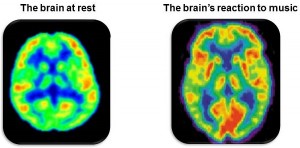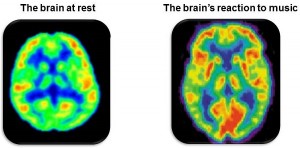Performance Enhancing Music, Part 2

Most people know intuitively that music can be a useful motivator. Perhaps you play music in the morning to help you wake up, listen to music during your workouts, or enlist the radio when driving to help stay focused and alert. Still, you may be surprised to learn that music has tested positively as performance-enhancing when paired with everyday activities.
Psychology and science - How music improves workout performance
Scientists are starting to unlock the benefits available from listening to music. A recent study published by Frontiers in Psychology summarizes that “people listen to music to regulate arousal and mood, to achieve self-awareness, and as an expression of social relatedness.”
While you may not have considered the correlation between music and behavior, these scientific findings have verified what history has long suggested: that music is deeply hard-wired into our brains.
Is there an evolutionary basis for the existence of music? This seems to be debatable, with scientist Steven Pinker famously describing music as the equivalent of “auditory cheesecake,” having essentially no evolutionary reason to exist.
Other scientists argue there are evolutionary explanations for music’s long-lasting role in humanity. Among these is Charles Darwin himself, who wrote in The Descent of Man, “I conclude that musical notes and rhythm were first acquired by…mankind for the sake of charming the opposite sex.”
This is your brain on music
Beginning with the neuroscience of music studies of the 1980s, scientists have begun to understand the relationship between music and behavior more clearly [Oliver Sacks' Musicophilia]. By examining the human nervous system, we’ve learned that music listening engages nearly every area of the brain that’s been identified, and involves nearly every neural subsystem [Daniel Levitin's This is Your Brain on Music].
When listening to music, a part of your brain called the nucleus accumbens triggers the release of the “pleasure chemical” dopamine. In a post-iPod era, it’s noteworthy that listening to your music on “shuffle” has been linked to producing higher amounts of dopamine. Who knew that just listening to your music in a random order could be great for your mental health?
Music drives stronger athletic performance
Sports offer an excellent framework for assessing the motivational power of music. The world-leading researcher on music for sports performance, Dr. Costas Karageorghis, makes the provocative claim that one can think of music as “a type of legal performance-enhancing drug.”
According to Dr. Karageorghis, scientific inquiry has revealed several ways music is performance-enhancing for sports, including “dissociation” when music distracts from fatigue sensations, synchronization of repetitive sports with music’s changing tempo, and others.
The impact of music on athletic performance isn’t insignificant either. One of Dr. Karageorghis’ studies determined that participants who cycled in time to music required 7 percent less oxygen to do the same work as cyclists who did not synchronize their movements with background music.
Music and shopping: Another winning combination
Music has also tested positively as performance-enhancing when paired with shopping. This is certainly true for retailers who use music strategically to drive the bottom line. Several studies over the past half-century have shown that matching the music’s tempo, volume, and genre to a retailer’s environment and customer demographic can positively affect sales.
Business Insider published a summary of results from major retail studies, some of which may surprise:
• Classical music leads customers to buy more expensive wine than Top 40 music,
• French music leads to purchases of more French wine and German music leads to purchases of more German wine, and
• Low-tempo music causes people to shop more slowly and spend more than fast-tempo music.
Some companies are also enhancing the consumer experience through music curation and content. Just this year, Starbucks introduced a first-of-its-kind partnership with Spotify. Starbucks customers can now listen to a variety of Starbucks-curated music through Spotify’s streaming service. For those who are fans of the company’s in-store music, Starbucks is providing something performance-enhancing for the bottom line and for the daily coffee ritual.
American Eagle Outfitters is another company that’s using music effectively. Since launching a free music streaming player in their app, customers who engage with radio are spending more time shopping (over 200% increase) and buying more frequently (over 300% increase in unique visitor to order conversion rate).
Coda
It’s clear that the music around us has a bigger impact than many assume. As the information age and technology continue to drive our listening experience, it’s empowering to know that music is such a performance-enhancing ingredient in our lives. And even if music amounts to mere “auditory cheesecake,” these are probably some of the most guiltless empty calories we could possibly enjoy.


 3 min
3 min